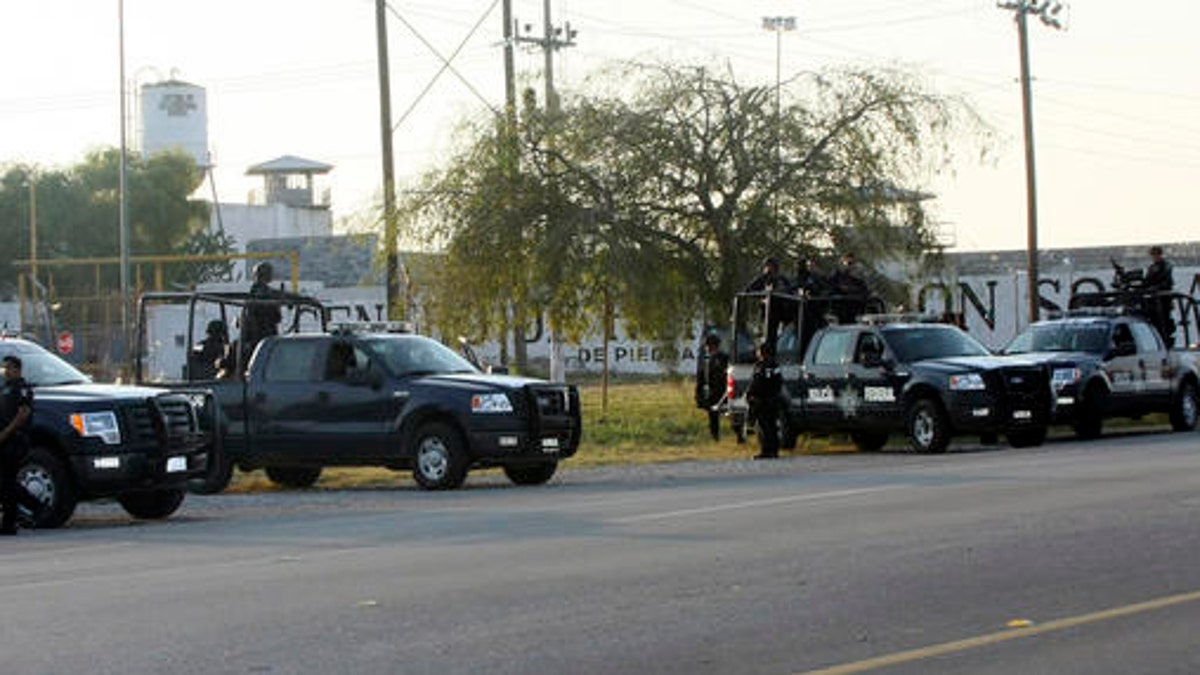
A group of Mexican federal police stand in front of the prison in Piedras Negras, Mexico, Monday Sept. 17, 2012. Authorities say 132 inmates have escaped from this jail in northern Mexico, sparking a search by federal police and soldiers in an area close to the U.S. border. (AP Photo/Adriana Alvarado) (AP2012)
Mexico’s first survey of its federal criminal justice system confirmed what many have assumed for years: The country’s prisons are packed with inmates imprisoned on drug charges and there is widespread corruption throughout the entire system.
More than 60 percent of the prisoners surveyed were serving sentences on drug offenses, including trafficking, consumption and possession. The report, compiled by the Centro de Investigacion y Docencia Economicas (CIDE), a Mexican think tank funded by the federal government, sampled 726 men and 95 women.
“Mexico is living through a prison boom not unlike that seen in the United States,” wrote Steven Dudley of InSight Crime, an investigative online outlet focusing on Latin America.“The reasons for this rise are many: The general public now reports more crimes; changes in the law set higher penalties for those crimes; and penal authorities have an increasing tendency to prolong prisoners' stays in jail for bad behavior.”
The report found that 80 percent of women in Mexican prisons were jailed for drug-related offenses, with the rest imprisoned for either kidnapping, homicide, weapons charges or involvement in organized crime.
It brings out the challenge of getting convictions to stick on high level drug traffickers.
The statistics offer a glimpse into a shadowy world inside Mexican prisons and offers an interesting glimpse at comparisons to the U.S. prison system, which has been widely criticized in the U.S. for high rates of imprisonment of people convicted on drug offenses.
Nearly half of U.S. inmates are serving drug sentences, with weapons charges and immigration charges rounding out next.
Some experts argue that the report’s statistics are skewed because the survey was conducted only in Mexican federal prisons and not state or local jails..
“The biggest thing that jumped out to me is that this survey is just of the federal system,” said Christopher Wilson, a researcher at the Mexico Institute, a think tank in Washington D.C. “That eliminates a whole group of crimes that are at the state level: robberies, homicides, things like that.”
Wilson was taken aback by the low volume of low-level drug offenses that led to imprisonment, with almost 41 percent serving time for drug crimes being charged for transportation and about 39 percent being imprisoned for possession.
“It brings out the challenge of getting convictions to stick on high-level drug traffickers,” he said. “Many high-level people get away without a serious conviction.”
The tactic under former Mexican President Felipe Calderón was labeled a “kingpin” approach, which meant to take down or arrest ranking members of the country’s drug cartels. Despite some high-profile arrests and killings, the approach failed to quell the drug violence and led to a fracturing of the cartels into even more warring factions..
Current President Enrique Peña Nieto said that he wants to move away from Calderón’s fight-the-cartel-head-on approach and instead focus on reducing violent crime that affect many in Mexico.
“There is not a fully in place strategy yet, but there seems to be some good ideas,” Wilson said. “Now it all depends on how it is implemented.”
Corruption and human rights abuses are also rampant in Mexico’s prison system, according to the new survey.
Almost 60 percent of prisoners surveyed said they had been beaten while in custody and 92 percent of those incarcerated claim to never have seen an arrest warrant.
“Mexico needs a clear, intelligent plan to address the very serious human rights problems you have inherited. A plan that will translate your important declarations of respect for human rights into a reality,” said José Miguel Vivanco, the Americas director of Human Rights Watch, in a letter to Peña Nieto. “In its absence, the climate of abuse and rampant impunity that has thrived over the past six years will only worsen.”






































